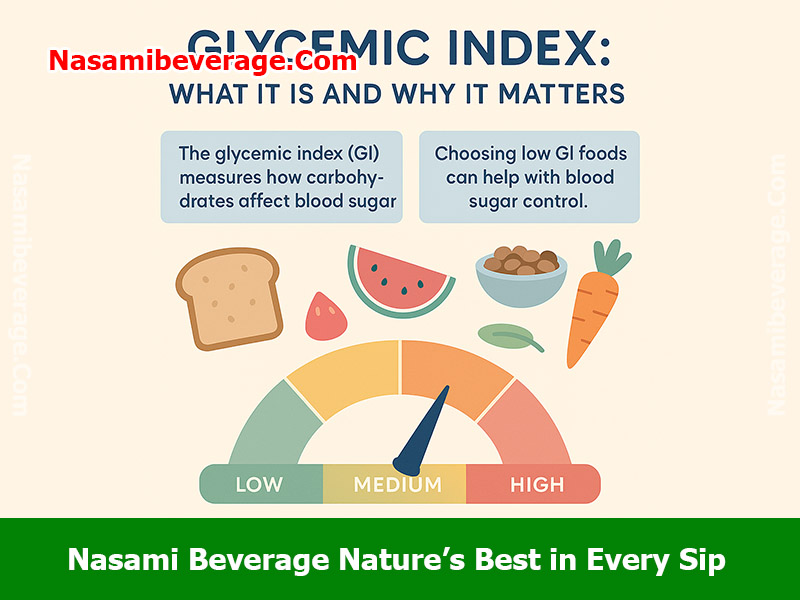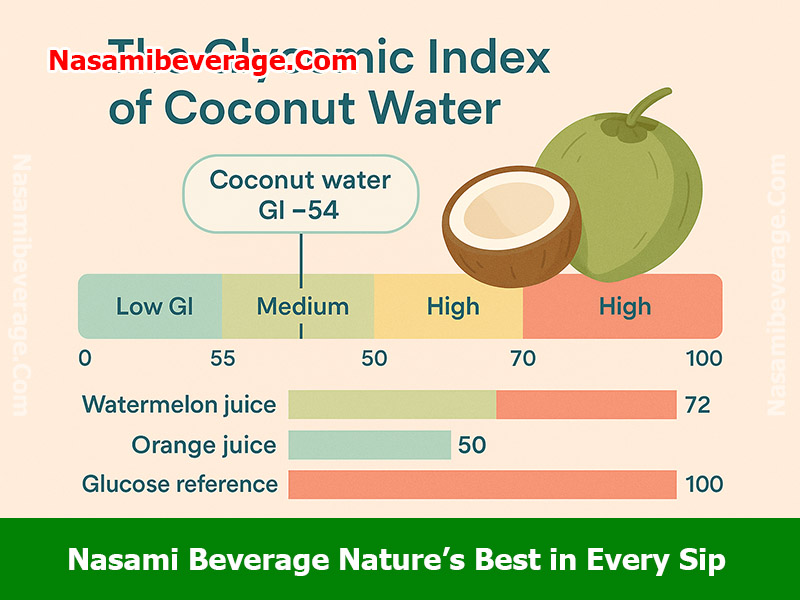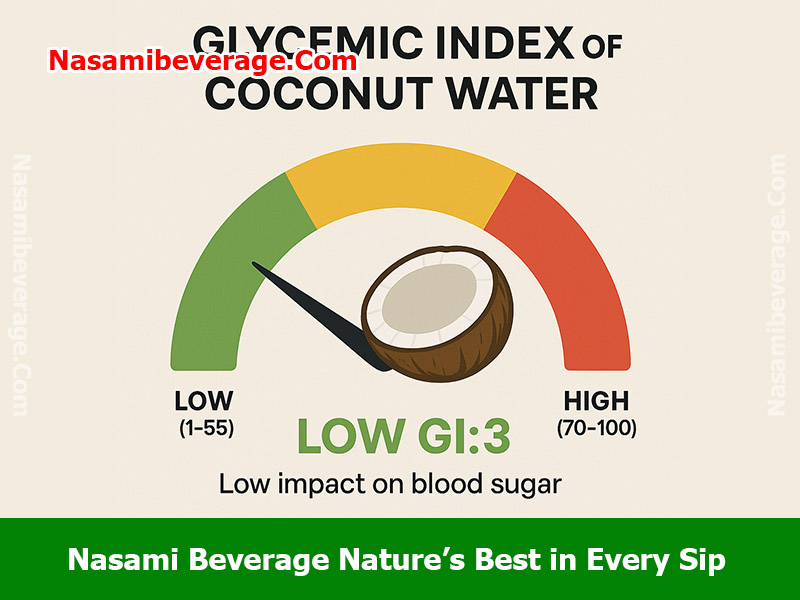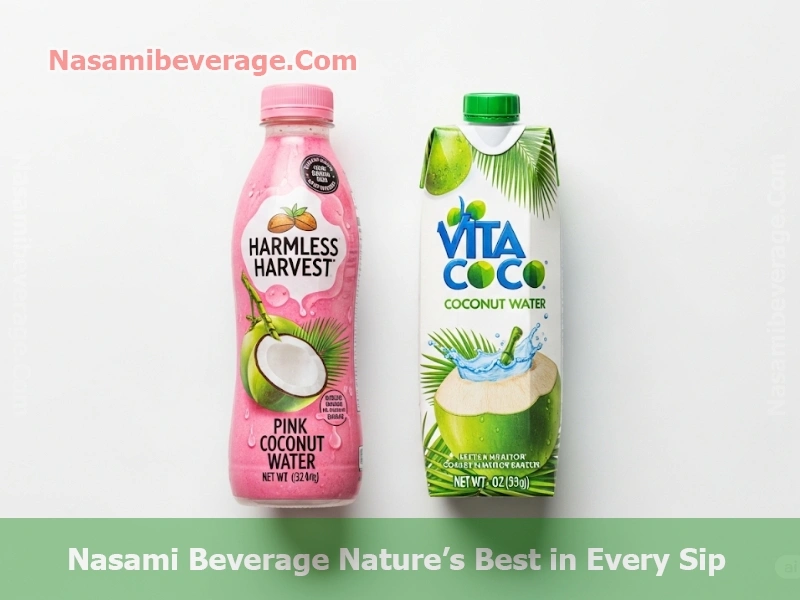GI index of Coconut water has surged in popularity as a natural hydration drink, but how does it impact blood sugar? This article dives into the glycemic index (GI) of coconut water, exploring its suitability for diabetes management, nutritional benefits, and practical ways to incorporate it into your diet. From understanding GI and glycemic load to comparing fresh versus packaged options, we’ll cover everything you need to know to make informed choices. Whether you’re health-conscious, managing diabetes, or seeking a low-GI beverage, read on to discover why coconut water might be your next go-to drink.
What Is the Glycemic Index and Why It Matters
Understanding Glycemic Index (GI)
The Glycemic Index (GI) measures how quickly a food raises blood sugar levels, with scores ranging from 0 to 100. Foods are classified as low (1–55), medium (56–69), or high (70+). Low-GI foods release sugar slowly, helping maintain stable blood sugar, which is crucial for diabetes management and sustained energy. For health-conscious individuals, choosing low-GI options like coconut water can support better metabolic health and reduce the risk of insulin spikes.

Glycemic Load (GL) Explained
While GI indicates the speed of blood sugar rise, Glycemic Load (GL) considers both the GI and the amount of carbohydrates in a serving. Coconut water typically has a low GI and a low GL due to its modest carbohydrate content (about 6-9 grams per cup). This makes it a smart choice for those monitoring blood sugar, as it has minimal impact compared to high-GL beverages like soda or fruit juice. Curious about how many carbs in coconut water exactly? Check out our detailed breakdown.
The Glycemic Index of Coconut Water
What Studies Say About Coconut Water’s GI
Research suggests coconut water has a low GI, with estimates ranging from 3 to 54, depending on the source and processing. A 2015 study on rats indicated that coconut water may improve insulin sensitivity, potentially aiding blood sugar control. While human studies are limited, the low carbohydrate content and natural sugars in coconut water make it a promising option for those seeking low-GI beverages. Its GI is significantly lower than sugary drinks, positioning it as a diabetes-friendly alternative.

Fresh vs. Packaged Coconut Water
Fresh coconut water, straight from the coconut, typically has the lowest GI due to its unprocessed nature and lack of added sugars. Packaged versions, like those from brands such as Vita Coco or Zico, may contain added sugars or preservatives, which can slightly elevate the GI. Always check labels for “100% pure” or “no added sugar” claims to ensure you’re getting the healthiest option. For example, Harmless Harvest emphasizes organic, minimally processed coconut water, making it a great choice for purists. Wondering how to know if coconut water is bad? Learn the signs to avoid spoiled products.
Is Coconut Water Good for Diabetes?
Benefits for Blood Sugar Management
Coconut water’s low GI, combined with its nutrient profile, makes it a potential ally for people with diabetes or prediabetes. Its potassium (around 600 mg per cup) and magnesium support insulin sensitivity, while its hydration properties help maintain overall metabolic health. Unlike high-GI sports drinks, coconut water provides natural electrolytes without causing rapid blood sugar spikes, making it ideal for active individuals or those managing diabetes.
Risks and Precautions
While coconut water is generally safe, moderation is key. Its high potassium content could pose risks for people with kidney issues, potentially leading to hyperkalemia. Experts recommend 1–2 cups (240–480 ml) daily for most people, but those with medical conditions should consult a healthcare provider. Additionally, avoid flavored or sweetened coconut water, as these can negate its low-GI benefits and impact blood sugar negatively.
Nutritional Profile of Coconut Water
Key Nutrients and Electrolytes
Coconut water is more than just a low-GI drink-it’s a nutritional powerhouse. A single cup provides potassium (600 mg), magnesium (60 mg), sodium (252 mg), and small amounts of vitamin C. These electrolytes make it a natural sports drink, ideal for rehydration after workouts or hot days. Its antioxidant properties also help combat oxidative stress, supporting overall wellness. Compared to sugary beverages, coconut water offers hydration with fewer calories (around 45 per cup). For more on its health perks, explore drinking coconut water benefits.
Comparison to Other Beverages
Beverage | GI | Calories (per cup) | Key Nutrients |
|---|---|---|---|
Coconut Water | 3–54 | 45 | Potassium, Magnesium, Sodium |
Sports Drink | 78 | 80 | Sodium, Artificial Sugars |
Soda | 63 | 150 | None (High Sugar) |
Water | 0 | 0 | None |
Coconut water stands out for its low GI and nutrient density, making it a smarter choice than sports drinks or soda. Unlike plain water, it provides electrolytes, enhancing its appeal for fitness enthusiasts and health-conscious consumers.
How to Incorporate Coconut Water into Your Diet
Best Times to Drink Coconut Water
Coconut water shines as a post-workout hydrator, thanks to its electrolyte content. It’s also a refreshing morning drink to kickstart your day or a midday pick-me-up to combat fatigue. For a creative twist, try a low-GI smoothie: blend 1 cup of coconut water, a handful of spinach, half a banana, and a scoop of unsweetened protein powder. This nutrient-packed drink keeps blood sugar stable while delivering flavor and hydration. Need inspiration? Check out our smoothie recipes using coconut water.

Choosing the Right Coconut Water
Opt for brands like Taste Nirvana or C2O Pure Coconut Water, which prioritize purity and avoid added sugars. Check for certifications like “organic” or “non-GMO” to ensure quality. If you have access to fresh coconuts, crack one open for the ultimate low-GI experience. When shopping, compare labels and steer clear of products with artificial flavors or high sugar content to maximize health benefits.
FAQs About Coconut Water and GI
What is the glycemic index of coconut water?
Coconut water has a low GI, typically ranging from 3 to 54, depending on whether it’s fresh or packaged. This makes it a blood sugar-friendly option compared to high-GI drinks.
Is coconut water safe for people with diabetes?
Yes, in moderation. Its low GI and nutrients like potassium support blood sugar management, but consult a doctor to ensure it fits your dietary needs.
Does packaged coconut water have a higher GI than fresh?
Packaged coconut water may have a slightly higher GI if it contains added sugars. Choose unsweetened, 100% pure options to keep the GI low.
How much coconut water should I drink daily?
Most people can safely enjoy 1–2 cups (240–480 ml) daily. Those with kidney issues or diabetes should seek medical advice to determine the right amount.
Coconut water is a refreshing, low-GI beverage that offers hydration, electrolytes, and potential blood sugar benefits. Whether you’re managing diabetes, pursuing a fitness-focused lifestyle, or simply seeking a healthier alternative to sugary drinks, coconut water is a versatile addition to your diet. Choose pure, unsweetened options from trusted brands like Nasami Beverage to enjoy its full benefits. Ready to explore more low-GI drinks? Dive into our guide to diabetes-friendly beverages for inspiration!
“Let food be thy medicine and medicine be thy food.” – Hippocrates.



